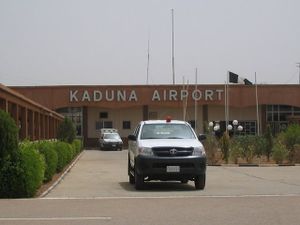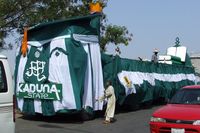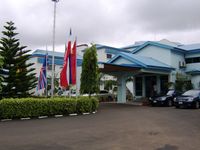Kaduna
| Kaduna | |
|---|---|
 |
|
 Kaduna
|
|
| Coordinates: | |
| Country | |
| State | Kaduna State |
| Government | |
| - Governor | Mohammed Namadi Sambo |
| Area | |
| - Total | 1,189.2 sq mi (3,080 km2) |
| Population (2006 census)[1] | |
| - Total | 760,084 |
| - Ethnicities | Gbagyi, Hausa, Yoruba, and Igbo, |
| Time zone | CET (UTC+1) |
| - Summer (DST) | CEST (UTC+1) |
| Website | http://www.kadunastate.gov.ng/ |
Kaduna is the state capital of Kaduna State in north-central Nigeria. The city, located on the Kaduna River, is a trade center and a major transportation hub for the surrounding agricultural areas with its rail and road junction. The population of Kaduna is at 760,084 as of the 2006 Nigerian census. The symbol of Kaduna is the crocodile, called kada in the native Hausa language.
Contents |
History
Kaduna was founded by the British in 1913 and became the capital of Nigeria's former Northern Region in 1917.[2] It retained this status until 1967.

Persons hailing from Kaduna include Emmanuel, Celestine Babayaro and Victor Moses (Nigerian footballers) and Fiona Fullerton (British actress and former Bond girl)
Religious strife
Due to its religious makeup, Kaduna has been the scene of deadly religious tensions between Muslims and Christians, particularly over the implementation of shari'a law in Kaduna State beginning in 2001. One particular incident in February 2000 saw at least 1,000 killed in a particular riot. The city remains segregated to this day, with Muslims living mainly in the north of the city and Christians in the south.[3]
Another incident in 2002 stemmed from an article in a Lagos newspaper that offended Muslims over the upcoming Miss World pageant scheduled for that week in the capital city of Abuja, suggesting that if Muhammad watched the beauty pageant he would end up marrying one of its contestants. A massive riot ensued. Churches were among the most frequently attacked targets: More than 20 were burned by Muslims. In retaliation, Christians burned 8 Mosques. Several hotels were also burned. The city suffered widespread damage, and 11,000 people were left homeless. In particular, the local offices of the newspaper which had published the offending article were torched. As a result, thousands of civilians fled the city to escape. Civil unrest soon spread to the capital city, Abuja. After four days of rioting, Nigerian security forces quelled the riots and arrested hundreds of rioters. A Temporary curfew was imposed, although individual killings continued. 215 bodies were counted on the streets or in morgues, while some others were buried by their families. 1,000 people were also wounded. The funerals of many of the victims took place shortly after the riot ended. Muslim rioters were tried in Sharia courts, while Christian rioters were tried by Civilian jursdictions. The editor of the Lagos newspaper that had provoked the riots was arrested, and Isioma Daniel, the reporter who wrote the article resigned and fled to Norway.[4]
Kaduna was also the place where Umar Farouk Abdulmutallab, the suspect of the terrorist attempt of arson on Northwest flight 253 in December 2009, grew up and returned to while on vacation [5].
Education
Kaduna is home to the Nigerian Defense Academy (1964), Kaduna Polytechnic (1968), Ahmadu Bello University (1962), Kaduna State University (2007), Nigerian College of Aviation Technology and the Nigerian Institute for Trypanosomiasis Research (1951).

Economy and transport
Kaduna is an industrial center of Northern Nigeria, manufacturing products like textiles, machinery, steel, aluminum, petroleum products and bearings.
Pottery is highly prized from Kaduna, especially from Maraban-Jos, which follows close behind Abuja and Minna. The main highway through the city is called Ahmadu Bello Way. Many of the place names come from past sultans, emirs and decorated Civil War heroes. Kaduna has a large market, recently rebuilt after an extensive fire in the mid-1990s.
There is a large racecourse, approximately one mile round, inside which the Ahmadu Yakubu Polo Club and Kaduna Crocodile Club are situated, whilst the Kaduna and Rugby Clubs are on the periphery. There are two airports, one of which is Kaduna Airport.
Chanchangi Airlines has its head office in Kaduna.[6]
Railways
In September, 2009, construction was approved for a railway branchline to the national capital of Abuja.[7]
References
- ↑ Summing the 2 LGAs Kaduna North/South as per:
Federal Republic of Nigeria Official Gazette (15 May 2007). "Legal Notice on Publication of the Details of the Breakdown of the National and State Provisional Totals 2006 Census" (PDF). http://www.nigerianstat.gov.ng/nbsapps/Connections/Pop2006.pdf. Retrieved 2007-05-19. - ↑ Fletcher, Banister; Dan Cruickshank (1996). "Africa". Sir Banister Fletcher's a History of Architecture. Architectural Press. p. 1466. ISBN 0750622679.
- ↑ ""BBC News - Kaduna: Nigeria's religious flashpoint"". 2002-12-20. http://news.bbc.co.uk/2/hi/africa/2579825.stm. Retrieved 2007-04-06.
- ↑ ""BBC News - Nigeria Buries Its Dead"". 2002-11-25. http://news.bbc.co.uk/2/hi/africa/2510743.stm. Retrieved 2009-02-07.
- ↑ "Lonely Trek to Radicalism for Terror Suspect"
- ↑ "Contacts." Chanchangi Airlines. Retrieved on 19 October 2009.
- ↑ http://www.railwaysafrica.com/2009/10/nigeria-approves-abuja-line-2/